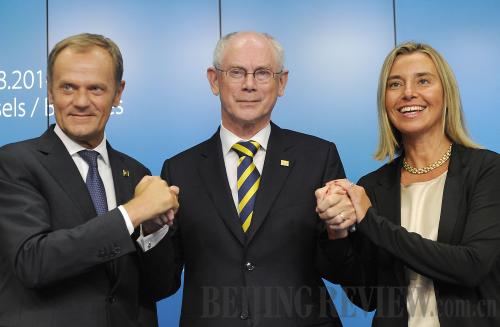|
 |
|
FRESH FACES: The European Council's newly elected president Donald Tusk (left) poses for a photograph along with current President Herman Van Rompuy (center) and new foreign affairs chief Federica Mogherini at the EU headquarters in Brussels on August 30 (AFP) |
With Polish Prime Minister Donald Tusk elected as president of the European Council and Italian Foreign Minister Federica Mogherini appointed the EU's foreign affairs chief at the European Council special meeting on August 30, the new leadership of the EU has finally taken shape. Taking into account that former Prime Minister of Luxembourg Jean-Claude Juncker was elected president of the European Commission in July, the three top EU positions are all in place as the union's governance also turns over a new leaf.
Tusk's mandate as European Council president will begin on December 1; the new European Commission will take office on November 1.
Challenges for EU governance
As a special actor falling somewhere between nation state and super state, the EU is different from both international organizations and federal states. It has formed a unique structure and pattern of governance featuring multi-polar and multi-level characteristics. While its features originate from Europe's political and historical tradition, EU governance actually took shape based on European economic and political integration after the two world wars in the last century. EU governance is seen by European scholars as a kind of post-modern, network governance, as well as an innovation of governance pattern.
However, imbalanced economic and political development in the bloc has been on the rise since its predecessor, the European Economic Community, was created in 1957, continuing today as it has developed into a large union with 28 member states. Problems relating to its legitimacy and identity have plagued the EU constantly, affecting the in-depth development of its governance. Meanwhile, outside of the EU, emerging economies are surging forward energetically as globalization develops in depth. The central position of Europe within the global capitalist structure is once again being threatened. The changing external situation has further minimized the available resources that Europe can employ to deal with the harsh and turbulent environment and constituted more complicated challenges for EU governance.
The imbalanced regional economy not only is one of the most important causes of the European sovereign debt crisis but also accounts for the EU's internal division. Hit simultaneously by the U.S. subprime crisis and sovereign debt crisis, the EU has continually been divided between creditor nations and debtor nations, rising countries and declining countries, pro-EU countries and Eurosceptic countries, forming new constraints for the development of EU governance. Moreover, the "identity crisis" caused by imbalanced development has also accelerated the estrangement between the people of the union's sovereign member countries.
Promoted by pro-independence nationalist parties, separatist movements in Spain's Catalonia, the United Kingdom's Scotland and Belgium's Flanders continue to flourish. In recent years, opinion polls in Catalonia have shown that nearly half of the people in the region wish to be independent from Spain; Scottish First Minister Alex Salmond, who is also leader of the Scottish National Party, has called for the establishment of an independent country and to become a member of the EU. Scotland held a referendum for independence on September 18.
To contain these trends, the EU has taken corresponding measures in the recent leadership transition, such as endowing the European Parliament with greater power on personnel management, including the appointment of the president of the EU Commission. The new European commissioners are from all 28 EU member states, an arrangement apparently made to display their sense of belonging to the EU.
| 